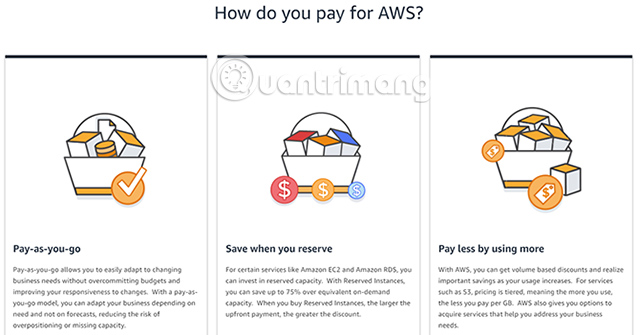Compare AWS and Microsoft Azure
Cloud computing has changed the way businesses think about their IT infrastructure. You no longer need to invest in expensive hardware or maintain your own server room. Now, you can have access to computing power and storage when needed, thanks to cloud services.
There are two 'big guys' dominating the cloud market: Amazon and Microsoft. Today's article will compare Amazon Web Services (AWS) and Microsoft Azure to find which cloud services are the best.
Is AWS or Microsoft Azure a better cloud storage service?
- Storage capacity of AWS and Microsoft Azure
- Amazon Web Services
- Microsoft Azure
- Computer power of AWS and Microsoft Azure
- Amazon Web Services
- Microsoft Azure
- Price and value of AWS compared to Microsoft Azure
- Amazon Web Services
- Microsoft Azure
- AWS or Microsoft Azure win?
Storage capacity of AWS and Microsoft Azure

You cannot use cloud services without thinking about storage solutions. Take a look at what cloud storage solutions Amazon and Microsoft offer are special.
Amazon Web Services
Amazon offers about 9 different storage products. Amazon Simple Storage Service (S3) is the most flexible storage solution. It can be used as a storage place for cloud-based applications, disaster recovery, media storage or acting as a cloud storage for your files. For example, you can use an S3 repository to back up your Linux devices.
If you are looking for a low-cost solution for your backups (and for use with AWS Backup), Amazon S3 Glacier is a better option. You must sacrifice regular access to lower storage costs. Access fees vary depending on how fast you want to access your data.
There are a number of more specialized storage products provided by Amazon, such as Cloud Data Migration Services, that will securely move files between other AWS storage services or from an external provider. Other products like Amazon FSx or Elastic File System will provide you with optimal storage for professional cloud projects, such as machine learning applications or enterprise databases.
Microsoft Azure
When compared directly, Azure Blob is very similar to Amazon S3. However, it has a slightly different structure. Azure Blob has 3 versions: Hot, Cool and Archive.
Hot Blob is for general purpose storage, intended for frequent access. Cool Blob is optimized to store data for a long time, at least 30 days. Amazon's S3 Infrequent Access has a minimum storage time of at least 30 days.
Blob Archive is Microsoft's storage product. It provides the best option for data you need for long term storage. Azure Archive has a minimum storage time of 180 days, twice as long as the minimum 90 days for the Amazon Glacier.
Microsoft also offers Azure Backup, a service for data backup and recovery in the cloud, that stores data in 'recovery service repositories' that you can access from the Azure Portal. If you want to mount your cloud storage like a network hard drive, Azure Files will meet your requirements.
There is also Azure Disk, Microsoft's storage product for virtual machines. Azure Disk is useful for professional operations that require high performance computing power, similar to Amazon FSx.
Computer power of AWS and Microsoft Azure

Both cloud services have an impressive range of products, offering the widest choice of computing power to customers, whether to host a simple web server or a cluster of servers. Enterprise data.
Amazon Web Services
Amazon's flagship is Elastic Compute Cloud (EC2), providing virtual machines that can be expanded using Amazon Machine Image (AMI). Each AMI is a virtual machine you can run, including an operating system like Linux or Windows and any additional software you may need.
You can set up automatically expanding your AMIs, so you'll never run out of system resources you need. Amazon offers hundreds of different EC2 variants for you to try, including from general-purpose, low-cost options to expensive and specific versions.
To better visualize the scope, you can quickly create an 'a1.medium' EC2 version with 1 virtual CPU and 2GB of RAM. Alternatively, you can use the memory-optimized EC2 version 'r5ad.24.xlarge' with 96 virtual CPUs and 768GB of RAM.
The choice depends on you. Flexibility means you will definitely find an EC2 version that suits your needs. Although it is possible to switch between different versions, you cannot customize them (for example, by increasing the RAM on an EC2 'a1.medium' version from 2GB to 4GB).
Microsoft Azure
Microsoft options are simply called virtual machines (VMs) and you can choose to run on Linux or Windows.
When comparing Azure to AWS, Azure's virtual machine is categorized in the same way as the AWS EC2 versions. They come with optimized alternatives for specific storage, memory and GPU requirements.
For example, if you need to output multiple 4K video, you can hire a version of Azure NV optimized for GPU. They come with 24 virtual CPUs, 224GB RAM and 4 GPUs with 48GB graphics RAM for each GPU.
For standard users, Azure B-series will be more suitable. B-series VM comes with between 1 and 20 virtual CPUs and RAM ranges from 0.5GB to 80GB. Like AWS, although it is possible to switch between versions, you cannot customize them. You must choose from existing pre-installed profiles.
Microsoft also offers the Azure Kubernetes Service (AKS) to help deploy containers easily with the Kubernetes management tool. If there are complex web applications that you need to deploy quickly, AKS can help you get started and run them quickly.
Price and value of AWS compared to Microsoft Azure

The biggest determinant in choosing cloud services can be price. Unfortunately, there are thousands of different product variants, everything from location to resource allocation to price impact.
Let's review everything, cover some of the most popular services, whether you choose AWS or Azure.
Amazon Web Services
Let's start with Amazon! There are several different models for AWS, which can affect the price you pay. You can pay less for resource usage, how often you access your data and the amount of data you use. You can also get a discount first, instead of paying for on-demand use.
Prices are usually calculated per hour or per GB. For example, Amazon S3 Standard's storage feature costs $ 0.023 (535VND) / GB for the first 50TB, while Amazon Glacier is $ 0,00099 (23VND) / GB. If you want to rent an EC2 version, you will have to pay in seconds. A t2.medium version, with 2 virtual CPUs and 2GB of RAM running Linux, will cost about $ 0.046 (1070 VND) per hour, or about $ 33.97 (VND 791,000) per month.
The good news is that you can try some AWS products for free. New customers can get 12 months of free use of 't2.micro' EC2 version for general purpose, with a virtual CPU and 1GB RAM.
Amazon's AWS simple monthly calculation tool provides you with a clear, up-to-date estimate of the monthly fees you have to pay for any AWS service. Refer to:
https://calculator.s3.amazonaws.com/index.html Microsoft Azure
Like AWS, Microsoft also offers 12 months free to try some Azure services. You can also pay $ 200 (VND 4,655,000) to try any service for 30 days.
You are also charged a second time for the services you use, unless you pay 1 to 3 years in advance, to get more discounts. Make a similar comparison, while an AWS 't2.medium' version costs $ 0.046 / hour, Azure 'B1MS' (with 2 virtual CPUs and 4GB RAM) only costs $ 0.04 (931VND) / hour, or about $ 30.36 (VND 707,000) / month.
If you want storage capacity to expand by using Azure Blobs, it will cost you from $ 0.0208 (484VND) / GB for Hot Blob or down to $ 0.0010 (23VND) / GB for Archive. . You may also have to pay extra to access your data, such as data access costs of $ 0.02 (465VND) / GB for Archive memory.
You can find specific costs for each package with the Microsoft Azure price calculator. Refer to:
https://azure.microsoft.com/en-us/pricing/calculator/ AWS or Microsoft Azure win?
Based on the criteria that the article has reviewed, the short and honest answer is that there is no clear winner. Both services offer similar features and performance. Although Amazon pioneered cloud services, Microsoft has done a good job of catching up with competitors in recent years. If price is your biggest concern, Azure is a little cheaper when charging by the hour, if you directly compare Azure with AWS.
Google has also used its huge resources to try to compete in this market, with custom virtual machines and impressive discounts of up to $ 300 (about 7,000,000 VND) for new users. Of course, you may want to build your own cloud storage with Raspberry Pi, if you prefer to use the DIY method.
Wish you have the right choice!
You should read it
- ★ Windows Azure will change its name to Microsoft Azure
- ★ Microsoft Azure is being used to host malware and C2 servers
- ★ Microsoft upgraded the cloud experience for users
- ★ Error on CPU seriously affects cloud storage services
- ★ Microsoft and Oracle, along with the 'matching swords' against Amazon in the cloud computing battle